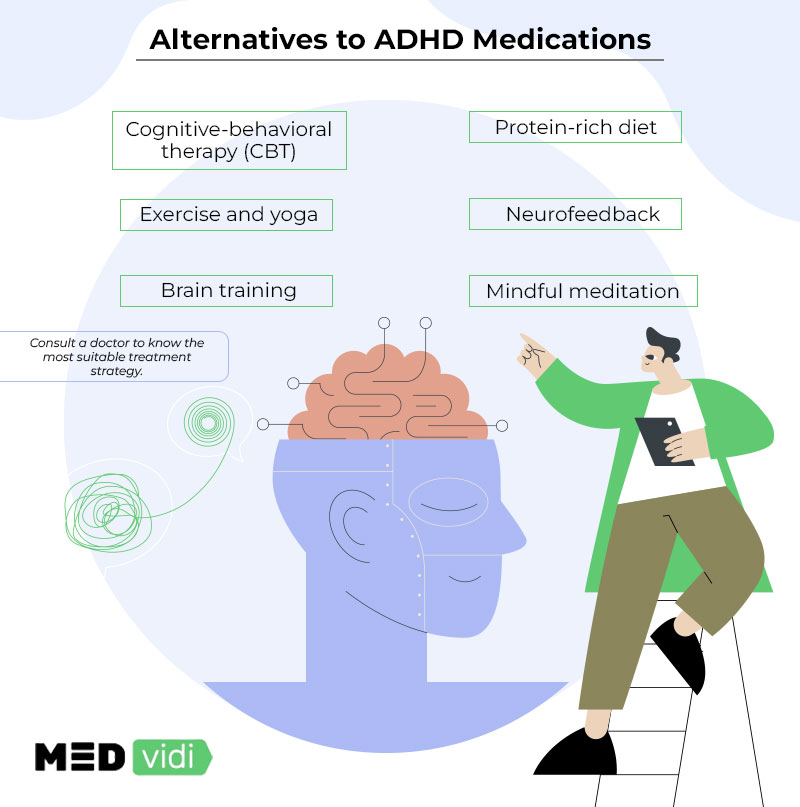Medication Management Support for Optimized Treatment Plans
Medication Management Support for Optimized Treatment Plans
Blog Article
Discovering Effective ADHD Therapy Alternatives for All Ages
The intricacies of Focus Deficit Attention Deficit Disorder Problem (ADHD) present special difficulties across different age groups, requiring a detailed exploration of reliable treatment alternatives. A combination of behavioral therapies, medicinal interventions, and way of living adjustments has revealed pledge in addressing the varied demands of individuals with ADHD.
Comprehending ADHD and Its Effect
Attention-Deficit/Hyperactivity Problem (ADHD) is a neurodevelopmental problem characterized by consistent patterns of inattention, hyperactivity, and impulsivity that can dramatically influence different elements of an individual's life. It typically shows up in childhood, although signs and symptoms can persist right into their adult years. The core signs of ADHD can disrupt educational efficiency, impede social communications, and make complex work-related ventures.
People with ADHD often battle with maintaining concentrate on jobs, arranging activities, and complying with with on instructions, which can result in scholastic underachievement (Depression Treatment). In social contexts, impulsivity may lead to problems in creating and maintaining relationships, as individuals might disrupt conversations or make rash choices without considering repercussions
In addition, ADHD can co-occur with other psychological health conditions, such as anxiety and clinical depression, even more making complex medical diagnosis and treatment. The variability in sign presentation means that ADHD can affect individuals differently, necessitating an individualized method to management. Understanding ADHD's diverse influence is crucial for developing effective strategies that support people in browsing day-to-day difficulties and achieving their potential. Comprehensive recognition of ADHD's nature and implications lays the groundwork for discovering suitable therapy alternatives tailored to every person's requirements.
Behavioral Therapies for ADHD
Countless behavioral therapies have been developed to properly resolve the obstacles connected with ADHD, focusing on modifying details actions and promoting crucial abilities. Amongst the most acknowledged strategies are cognitive-behavioral therapy (CBT), parent training, and social abilities training.
CBT assists individuals determine and change adverse thought patterns and behaviors, advertising a much more favorable overview and enhanced self-regulation. This treatment typically includes sensible strategies for taking care of impulsivity and improving company. Parent training programs empower caregivers by equipping them with techniques to strengthen positive behaviors and established regular limits, which can be particularly advantageous for children with ADHD.
Social skills training is another important element, teaching people with ADHD how to communicate properly with peers - Depression Treatment. This technique usually includes role-playing and responses to enhance communication, participation, and conflict resolution skills
Incorporating these behavior modifications into a comprehensive therapy strategy can significantly enhance functioning and top quality of life for people with ADHD. Inevitably, the efficiency of these treatments depends upon customized approaches that consider the special demands of everyone, consequently fostering strength and flexibility in life.
Drug Options Available
For many people with ADHD, drug can play a considerable function in managing symptoms and boosting overall functioning. Both main categories of medicines recommended for ADHD are stimulants and non-stimulants.
Stimulants, such as methylphenidate and amphetamine-based medicines, are one of the most generally used therapies. These medicines function by raising the degrees of neurotransmitters, particularly dopamine and norepinephrine, in the brain, which helps boost interest and decrease impulsivity and hyperactivity. They typically produce quick results, making them a recommended option for lots of people.

It is essential for medical care providers to perform a thorough evaluation to establish the most appropriate medication based upon specific demands, case history, and potential side results. Regular follow-up and tracking are additionally crucial to make certain the efficiency of the selected therapy and to make any essential modifications.
Lifestyle Changes to Take Into Consideration
Managing ADHD successfully prolongs past medication, as lifestyle adjustments can significantly boost total well-being and symptom control. Including organized routines is essential; consistent timetables help individuals with check my source ADHD manage their time successfully and lower sensations of bewilder.
Normal exercise is one more important component. Workout not just helps to enhance concentration however additionally increases mood and lowers anxiety degrees. Activities such as yoga or team sports can be specifically valuable, advertising both physical health and fitness and social interaction.
Nutrition also plays a pivotal duty. Depression Treatment. A balanced diet abundant in omega-3 fatty acids, whole grains, and lean proteins can add to improved focus and cognitive function. Limiting sugar and processed foods is advisable, as these can aggravate hyperactivity and impulsivity
Rest hygiene is crucial for taking care of ADHD symptoms. Establishing a routine sleep timetable and producing a relaxing setting can improve sleep quality, bring about much better attention and emotional policy.
Alternate and Holistic Approaches
Alternative and alternative strategies to ADHD therapy supply a varied range of alternatives that complement traditional techniques. These approaches commonly concentrate on way of living modifications, dietary treatments, and restorative practices that aim to boost total well-being while dealing with ADHD signs.

Mindfulness and behavioral therapies are also obtaining grip as all natural treatments. Practices such as yoga exercise, reflection, and cognitive-behavioral therapy can grow self-regulation and enhance focus. These techniques sustain emotional durability, which is especially useful for people with ADHD.
Herbal supplements, such as ginkgo biloba and ginseng, are often checked out; nevertheless, it is crucial to this seek advice from anchor medical care professionals before including these into treatment strategies. While option and alternative approaches can provide important support, they ought to ideally be used in conjunction with evidence-based therapies to achieve optimum results for handling ADHD throughout every ages.
Conclusion
In summary, reliable ADHD therapy demands an extensive method that consists of behavioral treatments, medication, way of life adjustments, and alternative approaches. This diverse technique highlights the importance of personalized care in resolving the diverse needs of individuals with ADHD throughout all age teams.
Report this page